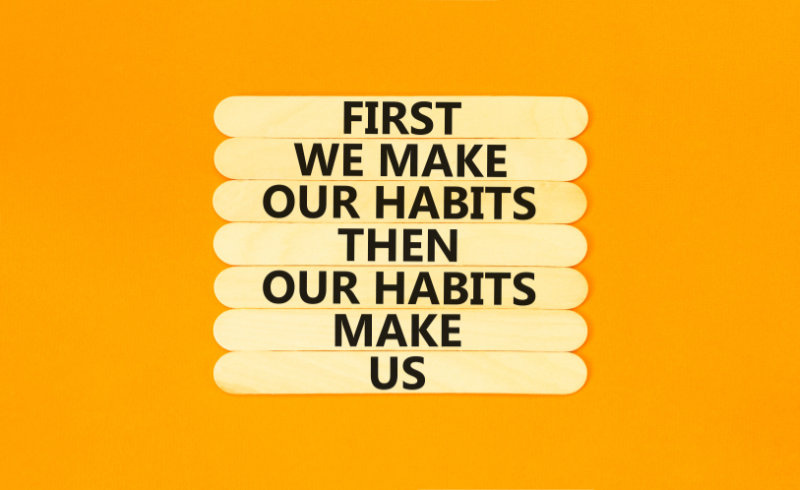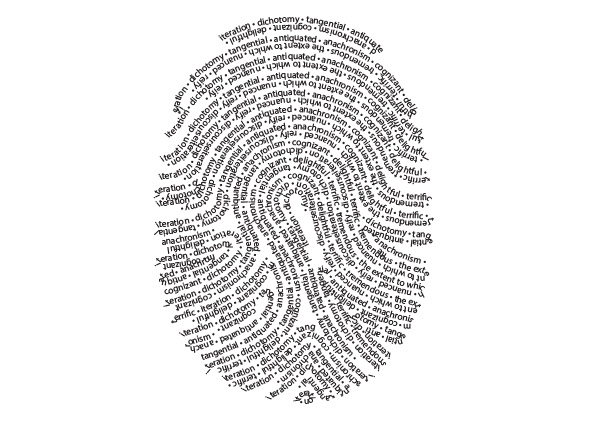Coaching Habits That Can Take Away From Your Effectiveness

The longer we do anything the more we fall into habits. Habits are time savers. They help us avoid making our lives more complex than they need to be. They often are shortcuts that help us to experience less stress and get things done, sometimes quite efficiently. Doing certain things by rote can serve us well. Health and wellness coaches are continuously helping their clients to establish healthy habits that work for their growth and wellness. There are also, of course those lifestyle habits that work against our wellness. Driving home we suddenly find ourselves in the line at the drive-through fast food restaurant. We’re mindlessly scrolling through Facebook and have lost track of time. Some habits work for us, some against us.
Habits can also be the opposite of consciousness. It’s lovely to allow our minds to wander while we brush our teeth, wash dishes, etc. Einstein is reputed to have said that “My best ideas come to me while I’m shaving.” Of course we’ve all dropped into our habitual behaviors and missed noticing things. Habits can dull awareness.
Coaching More Consciously
The longer we coach the more likely we are to slip into habit patterns in our coaching. We may tend to overuse certain phrases, become somewhat rigid in our protocols and coaching structure. The opposite is to coach mindfully. When we are centered, grounded and fully aware in the present moment, we do our best coaching. It’s those times when we don’t miss much. We are listening with all of our senses. We are seeing/hearing patterns in what our client is saying.
By listening to recordings (and watching video recordings) of our coaching we can discover many of our habits that we have fallen into. It might take listening with a colleague, a supervisor, or a mentor to discover the habits that have become so ingrained that they have assumed a cloak of invisibility. Just as we say about self-deception, the problem often is we aren’t aware of when we are actually deceiving ourselves. Just as that essentially defines self-deception, our habits fall into both conscious and unconscious categories.

Coaching Habits To Unhook From
Let’s take an overview of a variety of habits that might show up as we expand our awareness of them.
 • Our language
• Our language
Verbal tics – Saying “Okay”, or some equivalent, quickly after one’s client speaks. While a certain amount of this can show we are tracking with our client, the key is how often are we doing this.
Placeholders – Clients tend to use “placeholders”, saying “you know”, drawing out words, and speaking in ways that keep the “talking stick” in their own hand. Are we doing the same thing?
Fingerprint words – A coach may discover that they have pet words that they use over and over again. Often these words are a bit esoteric and can confuse the client if they are not part of that person’s common usage.
Check out my blog entitled – “Refining Coaching Linguistics: Verbal Tics, Placeholders and Fingerprint Words” .
Phrases that take away client autonomy. Eliminate the phrases: “You ought to”, “I want you to”, “You need to” and “You should” from your coaching vocabulary and you will see a marked improvement in the coaching relationship. This is a habit that can especially show up when we are working on Next Steps (setting Action Steps) with our clients.
• Our process
Following formulas or protocols too rigidly. Coaching with so much structure that we follow steps in what we have come to believe is the right order while missing the evidence from our client that this is not working optimally.
Starting every coaching session with a relaxation/visualization. This can be much appreciated when the client needs this but can be completely out of synch with the client who shows up eager to dive right into things.
Always anything? Certainly we are going to maintain a certain coaching structure that can serve our clients in many ways. However, have we fallen into always making certain requests, asking certain questions, etc.? Do we always have to leave our client with an inquiry? Do we always have to brainstorm? Do we always have to ask for take-aways at the end of a session? Each of these examples can be quite valuable and work very well for many of our sessions, but are such steps by the coach congruent with what is going on in the session at a particular moment? Are we in tune, in synch with our client, or do such actions feel disruptive to the flow of the session. Remember the coaching admonition to “dance in the moment”? Have structure but question routines that start to solidify.
Rescuing and reassuring too early. Let’s say our clients is making contact with some real emotion, or perhaps is struggling a little to find the best word. Instead of patiently giving them the space to connect with their feelings, or to do the work they need to do, we step in and either finish their sentence for them or shift away from the arising emotion. We seek to help them feel better by reassuring them about what they are describing and doing it far too early.
The Free Pass. “Oh, that’s okay.” Of all the ways to collude with our clients the quickly issued free pass on accountability has the most habit potential. See my blog on “12 Ways To Avoid Collusion In The Coaching Relationship”.
Rushing to the fix. This can become a habit through slipping back into the default mindset (consultant/clinical) we still have from our previous experience, or from what appears to be expediency. Clients come to us facing many barriers to their progress and it can be easy to launch immediately into problem solving. In fact we can even get in the habit of beginning a coaching session by saying “So! What issues do you want to work on today?”

• Our Methodology and Skill Usage
Coaching without a methodology! Our clients want to improve their lives in certain ways. This involves increased awareness and behavioral change. If our coaching is not based on a solid behavioral change methodology it is unlikely to be productive. Respecting our client’s autonomy does not mean we abandon all structure and have sessions where we, out of habit and routine, explore whatever topics our clients bring up in whatever order they arise.
Allowing some Active Listening Skills to be overused, while others are underused. As you review recordings of client sessions notice what skills you tend to reflexively use. Are we saying “sounds like” again and again? Have we fallen into ruts of asking questions and seldom making requests for clarification (tell me more about…)? Are we consciously selecting which skill to use, or have we fallen into too much routine? Are we remembering to use reflection of feeling and acknowledgement enough?
Question stacking. We ask a question, but before the client responds we add a second, and perhaps even a third question. We may be attempting with our second or third question to further clarify what we are asking. We may be engaging in ‘thinking out loud’. Either way it’s confusing to our client. Have faith in your first question. Listen for an answer. If clarification is needed it will be apparent.
Overreliance on questions. Are we relying on questions to the point where we are not using our Active Listening Skills adequately? Enrich your coaching conversations with more reflections, paraphrasing, acknowledgement, and expressions of empathy.
My intent in identifying some of the more common habits we all can fall into is to bring them to awareness and help you to hone your craft as a coach. It helps to haul out what we might call our “coaching whetstone” and sharpen our edge. As I said above, habits dull awareness. They also can have the potential to dull our performance as a coach. Acknowledge your strengths as a coach. Build upon them, then, every once in a while, examine the way you are coaching and see if any of your coaching habits (just like lifestyle habits) are working for you, or against you. Coach on!
 Michael Arloski, Ph.D., PCC, NBC-HWC is CEO and Founder of Real Balance Global Wellness – a world leader in health and wellness coach training (https://realbalance.com/). Doctor Arloski is a pioneering architect of the field of health and wellness coaching. He and his company have trained thousands of coaches around the world.
Michael Arloski, Ph.D., PCC, NBC-HWC is CEO and Founder of Real Balance Global Wellness – a world leader in health and wellness coach training (https://realbalance.com/). Doctor Arloski is a pioneering architect of the field of health and wellness coaching. He and his company have trained thousands of coaches around the world.








Only registered and logged in readers can leave comments.